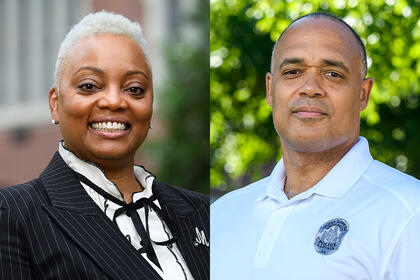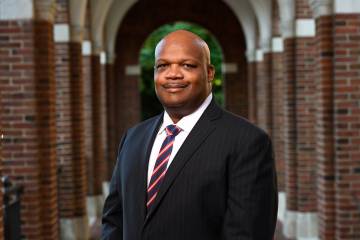- Name
- Johns Hopkins Media Relations
- jhunews@jhu.edu
- Office phone
- 443-997-9009
Johns Hopkins Public Safety today announced key steps in its ongoing efforts to enhance public safety on and around the university's campuses—the hiring of two veteran officers to leadership positions with the Johns Hopkins Police Department (JHPD) and the publication of policies and procedures that will serve as the department's foundation. Community input played a critical role in supporting the search for these key leaders and the development of the final policies.
The JHPD's policies—which were recently finalized following an extensive four-month period of feedback and input from the Hopkins community and neighbors throughout Baltimore—were developed through the collaborative efforts of community advocates and leading experts in law enforcement reform efforts across the nation, as well as the Johns Hopkins Police Department Accountability Board.
"I want to express my deep gratitude to everyone in the community who has taken the time to engage with me and other Johns Hopkins Public Safety (JHPS) leaders while we worked to enhance our current operations," Branville Bard Jr., vice president for public safety and chief of police, wrote in a message to the Hopkins community today. "Your feedback has been not just valuable, but integral to the development of the JHPD."
Monique "Mo" Brown, a 24-year veteran of the Baltimore Police Department (BPD) who most recently served as BPD's deputy commissioner of Patrol and the Community Policing Bureau, will be the JHPD's deputy chief of operations, responsible for oversight and management of police services for the university's Homewood, East Baltimore, and Peabody campuses. Brown, a current and lifelong Baltimore resident who graduated from Mergenthaler Vocational-Technical (MERVO) High School, is respected locally and nationally for her extensive work in community engagement, youth initiatives, violence reduction, and police reform. Brown was selected following a national search.
"I am disappointed to see Deputy Commissioner Brown leave the BPD but extremely happy for her and proud of her as she moves into the next chapter in her career," Baltimore Police Commissioner Richard Worley said. "Plus, she is still working in our great city with our partners at the JHPD."
Added state Sen. Cory McCray: "Born and raised in Baltimore, Monique 'Mo' Brown embodies our city's spirit and resilience. She understands our strengths and areas for growth on a profound level. This moment is unique, as one of our own steps into a role that allows her to invest her heart and soul into the community she cherishes. Mo's appointment as JHPD's deputy chief of operations is more than a career milestone; it's a testament to what relentless dedication and visionary leadership can achieve."

Image caption: Mo Brown and Teddy Reed
Robert "Teddy" Reed brings more than 30 years of policing experience to the role of captain of the JHPD, which he assumed on June 17. In this position, he will ensure the JHPD delivers highly professional, community-oriented policing and will regularly engage with students, faculty, staff, and neighbors of the university. Most recently, Reed, a Baltimore resident, served as a commander in the Administrative and Technical Support Bureau at Towson University.
"I have always known Teddy to be of high energy, sound integrity, and genuinely interested in helping people to improve their quality of life where he is able," said Charles J. Herring, chief of police and associate vice president for the Office of Public Safety at Towson University. "Teddy is a positive addition and will be a driving force with the Johns Hopkins Police Department. I, along with everyone at Towson University, wish him the best as he joins the JHU community."
Added Bard: "Mo and Teddy serve as excellent examples of the caliber of police officers we are proud to have on our team, and they will be an inspiration as we continue to recruit and hire additional officers."
Johns Hopkins has a holistic, layered approach to public safety that incorporates community partnerships and public safety innovations into its operations to improve the overall well-being of the campus community. Brown and Reed will work closely with the university's existing Public Safety team, including campus security and experts in behavioral health. Bard noted that a small number of additional team members as well JHPD police vehicles are expected to be on campus by the beginning of the fall semester.
The JHPD's day-to-day operations will be informed by a set of policies and procedures, published today following a lengthy community feedback and revision process that allowed for input from faculty, staff, students, members of the Johns Hopkins Police Accountability Board, and Baltimore residents. The JHPD's policies were developed in collaboration with independent experts from the National Policing Institute, a nonprofit organization dedicated to advancing excellence in policing, and 21CP Solutions, an expert consulting team made up of former law enforcement personnel, academics, civil rights lawyers, and community leaders dedicated to advancing safe, fair, equitable, and inclusive public safety solutions.
The university today also published a disposition report detailing all comments received and actions taken during the public comment period and an external report that provides an overview of the policy development and feedback processes.
"These policies adhere to national best practices in community-focused public safety and reflect the values of Johns Hopkins and the objectives of the JHPD-enabling legislation," Bard wrote. "The policy process demonstrates our commitment to an extensive, collaborative, transparent review ensuring our policies are responsive to community input."
The JHPD hires will work in partnership with current Johns Hopkins Public Safety employees across the university's campuses and facilities in Baltimore and Washington, D.C. The Johns Hopkins Public Safety team can be reached 24 hours a day, seven days a week at 667-208-1200.
Posted in University News
Tagged public safety









